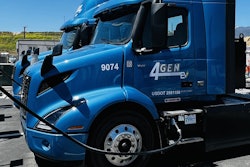California Air Resources Board could be exceeding its legal authority if it enforces provisions of its transport refrigeration units rule in the absence of an Environmental Protection Agency waiver, the American Trucking Associations warned in a Jan. 24 letter to the state agency. The TRU regulation requires additional emissions controls on truck and trailer refrigeration units, starting with model year 2001 and older units, beginning Dec. 31, 2008.
Shipper Sears Roebuck & Co. and intermediary National Logistics Corp. are jointly and severally liable for nearly a half million in freight charges owed to Oak Harbor Freight Lines, the U.S. Court of Appeals for the Ninth Circuit ruled in January. The court concluded, among other things, that Sears bore the risk of nonpayment when it chose to pay freight charges through a broker rather than directly to the motor carrier. The court’s opinion (Case No. 06-35460) is available at www.ca9.uscourts.gov.
Pennsylvania Department of Environmental Protection is considering a rulemaking that would limit truck idling to five minutes per hour, effective as early as this summer. The ban would not apply when ambient temperatures are below 40 degrees Fahrenheit or above 75 degrees.
Tractor-trailers now are banned from the left lane of a 40-mile stretch of Florida’s Turnpike through South Florida. The restriction will be enforced from the Lantana toll plaza south to the Golden Glades interchange. Truck drivers caught violating the ban face a fine of up to $130.
Q We are a small carrier that placed our public liability insurance with a large insurer through an independent agent affiliated with a bank. Premiums were to be assessed based upon a percentage of gross receipts, and the agent told us gross receipts excluded pass-through items such as fuel surcharge and lumpers’ fees. Months into the policy period, the insurer audited our operation, included the fuel surcharge and lumpers’ fees, and increased our premiums by 30 percent. What recourse, if any, do we have?
A This is not the first complaint I have received about the arrogant audit procedures of this insurer. The insurance form on which this policy is written does not exclude pass-through items. The insurer will insist that you are liable for this excess premium under the insurance contract and may hold your continued coverage hostage until you pay.
At time of issuance, the underwriter assessed your risk of loss. I am confident you provided both revenue and mileage figures at the time of binding and that they quoted you a premium. It seems blatantly unfair for the insurer to now recalculate the premium by as much as 30 percent by including fuel surcharge and lumpers’ fees if there was no increased risk of loss. As one knowledgeable truck insurance agent says, “If the pass-throughs were excluded in the estimated revenue, the pass-throughs should be excluded from the audit.”
In a time of fuel volatility, many sophisticated insurers now quote rates based upon mileage, not revenue. Premiums based on miles driven are a more accurate yardstick of liability exposure and, therefore, eliminate these anomalies. Typically, knowledgeable insurers that quote premiums on a revenue basis exclude pass-through items like fuel surcharge and lumpers’ fees. So when you bought this policy, it was perfectly reasonable for you to rely upon the agent’s representation that these items were not included in the price.
Yet clearly the insurer will disavow any representation made to you by the independent agent. Instead, it will declare that the standard insurance form on which the policy is written is clear, that the audit is proper and that the assessment is lawful. Your recourse will be to the agent who, regardless of whether it represented you or the insurance company in the transaction, owed you a duty of due diligence. Agents carry errors-and-omissions insurance and frequently are called upon to answer claims of this sort, but favorable resolution of this issue will not be easy. Every day you continue with this policy, you will be exacerbating your potential loss. I recommend that you find alternative coverage and begin working with knowledgeable truck insurance agents as soon as possible.
Don’t rely on oral representations by agents with respect to coverage. When soliciting quotations, specify in written requests for proposals the precise terms and conditions of the written proposal you expect from the agent. Describe precisely the nature of your operations, the full scope of the coverage requested and the basis for premium assessment. Take special care in at least three problem areas: (1) The method of assessing the liability premium (a mileage basis is preferable); (2) specificity with respect to the handling of owner-operators if worker’s compensation is involved; and (3) a demand that all possible exclusions for cargo coverage be expressly set forth at the time of quotation.
New Jersey issues new truck regulations
New Jersey Department of Transportation in January issued new regulations requiring 102-inch-wide trucks and double-trailer truck combinations to use the National Network unless seeking “food, fuel, rest, repairs, or to reach a terminal” by the shortest travel route. Upon completing each trip, trucks are required to return to the National Network to get to their next destination.
Unlike the 1999 truck regulations that were ruled unconstitutional, the new rules apply the routing requirements to both interstate and intrastate 102-inch-wide standard trucks and double-trailer truck combinations. The regulations replace emergency regulations adopted in June 2006 as a result of a ruling by the U.S. Court of Appeals for the Third Circuit that New Jersey’s 1999 truck routing regulations violated the provisions of the Commerce Clause of the U.S. Constitution.
New Jersey DOT developed the rules as part of a truck task force chaired by Commissioner Kris Kolluri consisting of affected constituency groups, including the League of Municipalities, the North Jersey Transportation Planning Authority, the New Jersey State Police and the New Jersey Motor Truck Association.








![Volvo Vnl Sleeper Review[20]](https://img.ccjdigital.com/mindful/rr/workspaces/default/uploads/2025/11/volvo-vnl-sleeper-review20.lrVppY9UDR.jpg?auto=format%2Ccompress&fit=crop&h=167&q=70&w=250)
